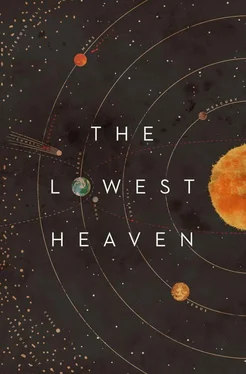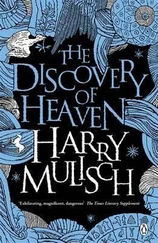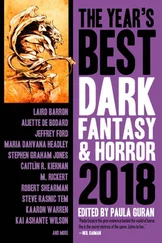“Goodbye,” Sharon says, touching the big red X. “You are so not in the running anymore.”
Pluto gets to her knees and puts her face to the floor, sniffs around the edge of the airlock hatch.
“What are you doing?” Sharon asks.
“I thought I felt air coming in from outside. Warm air. It smelt of fruit and flowers.”
“There’s no air on Eros, Pluto.”
Pluto takes a deep breath, lets it out. Takes another. She disarms the hatch locks. “I’m going outside. You coming?”
Sharon looks through the viewport again, the angry visage of Earth slapping against it like a gigantic, malicious moth, and turns to her sister. “Will it hurt?”
“No. It will be instant. You won’t feel a thing.”
“Not that. I mean, will it hurt the parents? When we hit them?”
“I don’t know.”
Pluto waits for Sharon to join her at the airlock.
“We’ll always be here,” Sharon giggles, tapping her chest. “What a load of fucking dreckitude.”

She had waited a full turn around the galaxy to come back here. She could wait a couple terrestrial turns more.
_________
This is one of nine wall hangings, all on astronomical themes, produced by the Working Men’s Educational Union. The Union (founded 1853) was a philanthropic society with the object of “the elevation of the working classes, as regards their physical, intellectual, moral and religious condition”. This banner would have been used in one of the Union’s many lectures. It depicts two star clusters or nebulae. (c1850)
Enyo meditated at mealtimes within the internod, huffing liquor vapors from a dead comrade’s shattered skull. This deep within the satellite, ostensibly safe beneath the puckered skein of the peridium, she went over the lists of the dead.
She recited her own name first.
Enyo’s memory was a severed ocular scelera; leaking aqueous humor, slowing losing shape as the satellite she commanded spun back to the beginning. The cargo she carried was unknown to her, a vital piece of knowledge that had escaped the punctured flesh of her memory.
She had named the ship after herself◦– Enyo-Enyo◦– without any hint of irony. The idea that Enyo had any irony left was a riotous laugh even without knowing the satellite’s moniker, and her Second, Reeb, amused himself often at her shattering attempt at humor.
After the purging of every crew, Reeb came into Enyo’s pulpy green quarters, his long face set in a black, graven expression she had come to call winter, for it came as often as she remembered that season in her childhood.
“Why don’t we finish out this turn alone?” he would say. “We can manage the internod ourselves. Besides, they don’t make engineers the way they did eight turns ago.”
“There’s the matter of the prisoner,” she would say.
And he would throw up his dark, scarred hands and sigh and say, “Yes, there’s the prisoner.”
It was Enyo’s duty, her vocation, her obsession, to tread down the tongue of the spiraling umbilicus from the internod to the holding pod rotation of the satellite, to tend to the prisoner.
Each time, she greeted the semblance of a body suspended in viscous green fluid with the same incurious moue she had seen Justice wear in propaganda posters during the war. Some part of her wondered if the body would recognize it. If they could talk of those times. But who knew how many turns old it was? Who knew how many other wars it had seen? On a large enough scale, her war was nothing. A few million dead. A system destroyed.
The body’s eyes were always closed, its sex indeterminate, its face a morass of dark, thread-like tentacles and fleshy growths. Most sessions, she merely came down and unlocked the feed cabinet, filled a clean syringe with dark fluid, and inserted it into the black fungal sucker fused to the transparent cell. Sometimes, when the body absorbed the fluid, it would writhe and twist, lost in the ecstasy of fulfillment.
Enyo usually went straight back to the internod to recite her lists of dead, after. But she had been known to linger, to sit at the flat, gurgling drive that kept her charge in permanent stasis.
She had stopped wondering where the body had come from, or who it had been. Her interest was in pondering what it would become when they reached its destination. She lost track of time in these intimate reveries, often. After half a rotation of contemplation, Reeb would do a sweep of the satellite. He would find her alive and intact, and perhaps he would go back to playing screes or fucking one of the engineers or concocting a vile hallucinogen the gelatinous consistency of aloe. They were a pair of two, a crew of three, picking up rim trash and mutilated memories in the seams between the stars during the long night of their orbit around the galactic core.
When they neared the scrap belt called Stile, Enyo was mildly surprised to see the collection of spinning habited asteroids virtually unchanged from the turn before.
“It’s time,” she told Reeb. “Without more fuel, we won’t make it the full turn.” And she would not be able to drop off the prisoner.
He gave her his winter look. She had left the last of his engineers on a paltry rock the color of foam some time before. He did not know why they needed the crew now; he did not have her sense of things, of the way time moved here. But he would be lonely. It’s why he always agreed to take on another crew, even knowing their fate.
“How many more?” he said.
“This is the last turn,” she said. “Then we are finished.”
She let Reeb pick the new crew. He launched a self-propelled spore from the outernod well ahead of their arrival on the outskirts of Stile. The dusty ring of settlements within the asteroid belt circled a bloated, dying star. Had it been dying the last time they passed? Enyo could not remember.
Reeb’s sister worked among the debris, digging through old spores and satellites, piecing together their innards, selling them as pirated vessels imbued with the spirit of cheap colonial grit.
Enyo had not seen Reeb’s sister in many turns, when speaking of the war, of genocide◦– in terms outside the propagandic◦– was still new and unsettling and got them thrown out of establishments. Broodbreeders and creep-cleaners called them void people, diseased, marked for a dry asphyxiation aboard a viral satellite, drifting ever-aimless across limitless space. They were not far wrong. Sometimes Enyo wondered if they really knew who she was.
She heard Reeb’s sister slide up the umbilicus into the internod. Heard her hesitate on the threshold, the lubrication of the umbilicus slick on her skin.
“This your satellite?” Reeb’s sister asked.
Enyo had expected to feel nothing at her voice, but like the body in the tank, she was sometimes surprised at what was fed to her. Something in her flared, and darkened, and died. It was this snapshot of Reeb’s sister that she always hoped was the true one. The real one. But she knew better.
She swiveled. Reeb’s sister did not take up the tubal port as Reeb did, but inhabited it in the loose way the woman inhabited all spaces, wrapping it around herself like a shroud, blurring the edges of her surrounds◦– or perhaps Enyo’s eyes were simply going bad again. The satellite changed them out every quarter turn. The woman had once had the body of a dancer, but like all of them, she had atrophied, and though she was naturally thin, it was a thinness borne of hunger and muscle loss. Her eyes were black as Reeb’s, but their color was the only feature they shared. She was violet black to Reeb’s tawny brown, slight in the hips and shoulders, delicate in the wrists and ankles, light enough, perhaps, to fly.
Читать дальше













